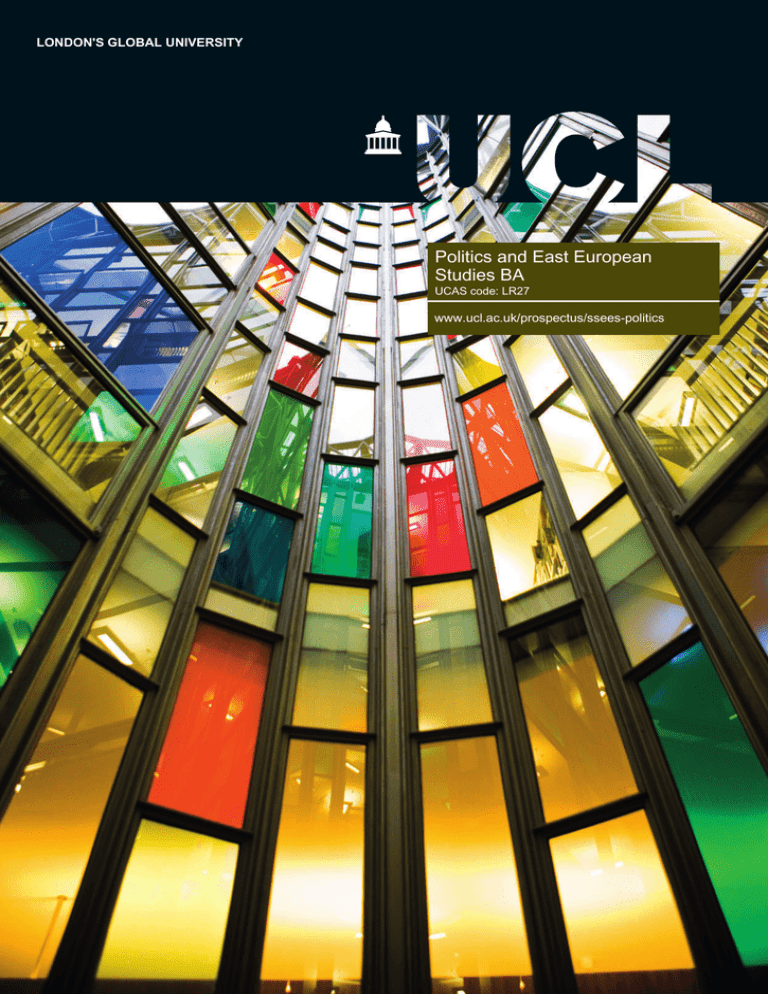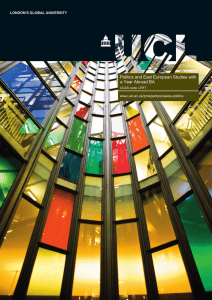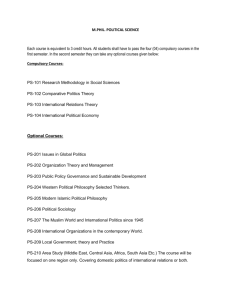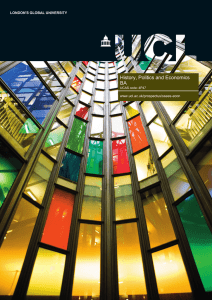Politics and East European Studies BA LONDON'S GLOBAL UNIVERSITY www.ucl.ac.uk/prospectus/ssees-politics
advertisement

LONDON'S GLOBAL UNIVERSITY Politics and East European Studies BA UCAS code: LR27 www.ucl.ac.uk/prospectus/ssees-politics Politics and East European Studies BA This degree programme combines training in politics, international relations and security issues with specialist courses studying Russia and Eastern Europe which are of contemporary relevance in the context of an enlarged EU and the changing international situation. Degree summary • This is an exciting time to study a region that is in a process of almost continuous change. Many central European countries are now becoming members of the enlarged European Union while Russia is re-emerging as an assertive power with major international consequences. • Gain knowledge of theoretical frameworks in social and political science and how to apply them to understand the processes of political and social change in Russia, the former Soviet Union and central and Eastern Europe. • The programme is taught by acknowledged experts in the field, all of whom speak one or more of the languages of the region. • The department is regularly consulted by organisations such as the Foreign & Commonwealth Office, the European Bank for Reconstruction and Development and the European Union. You will take compulsory courses in politics, sociology and international relations in years one and two - including courses on the political developments of Russia and other parts of the former USSR, and central and south-eastern Europe. You will also undertake a dissertation, based on an independent research project, in your final year. Beyond this you can choose additional courses in economics, history, language, politics and sociology to match your interests. You are strongly encouraged to learn Russian or another east European language as part of your degree. As well as making use of our excellent language teaching opportunities, you will also be able to access the foreign language resources of the SSEES Library. Your learning You will be taught through a combination of lectures and classes. You will be expected to prepare presentations and papers on selected topics for classes, sometimes as an individual and sometimes as part of a group, followed by class discussion. You will also receive regular written work, including essay, exercises and case study analyses. You will receive feedback from tutors on both your oral and written work and your presentation skills to help develop your analytical ability in these areas. Your assessment will be based on unseen written examinations, coursework and a supervised final-year dissertation. Your career After graduating from this programme you will have specialist knowledge of a region whose changing politics, economics and international relations are rapidly reshaping our own national and social understanding of the world, as well as a raft of transferable skills. Career destinations of previous graduates include government service, international agencies and non-governmental organisations (NGOs), consultancy (economic, political risk, security, marketing), banking, financial services, law, media, teaching and the leisure industry, as well as further study. First destinations of recent graduates (2010-2013) of this programme include: • • Royal Marine Officer, Royal Navy • • • Corporate Finance Trader, Transglobal Full-time student, MPhil in Russian and East European Studies at the University of Oxford Political Campaign Consultant, CT Group Legal Secretary, European Parliament Degree structure In each year of your degree you will take a number of individual courses, normally valued at 0.5 or 1.0 credits, adding up to a total of 4.0 credits for the year. Courses are assessed in the academic year in which they are taken. The balance of compulsory and optional courses varies from programme to programme and year to year. A 1.0 credit is considered equivalent to 15 credits in the European Credit Transfer System (ECTS). Year One Compulsory courses Communism in the Soviet Union and Eastern Europe Understanding Politics: The Big Questions in Contemporary Europe Understanding Politics: How Politics Works Understanding Society: Introduction to Political Sociology Understanding Society: Introduction to Social Theory Optional courses You will select 1.5 credits of optional courses which may include the following: History of Eastern Europe since 1856 Introduction to International Relations Introduction to Macroeconomics Introduction to Microeconomics Other optional courses are available in East European Languages and Culture, History, or Russian. Language course options are available within UCL SSEES or the UCL Centre for Languages & International Education (CLIE). Year Two Compulsory courses Comparative Political Analysis Researching Politics and Society At least two courses from: Post-Soviet Politics and Society Russian Politics and Society South-East European Politics and Societies Politics and Society in Central and Eastern Europe Optional courses You will select up to 2.0 credits from a range of additional options. Options may include: Contemporary Polish Cinema Culture in Eastern Europe: Anthropological Approaches Democracy and Democratization History of European Political Ideas Language Course Migration and Health Political Economy of European Integration Topics in Microeconomics Other options will be available in East European Languages and Culture, History or Russian. Final Year Compulsory courses Dissertation Optional courses You will select 3.0 credits from a wide range of course options. Options may include: Corruption and Governance European Security History of European Political Ideas Baltic Politics and Society Political Economy of European Integration Soviet and Russian Foreign Policy Other options will be available in Russian, History, East European Languages and Culture. Entry requirements A levels On the basis of our assessment of your application we will decide whether to make you an offer and if you are successful, you will be invited to a post-offer open day (if you live in the UK). A level grades AAA-AAB Fees A level subjects No specific subjects. UK/EU fee £9,000 (2016/17) AS levels For UK-based students a pass in a further subject at AS level or equivalent is required. Overseas fee £16,130 (2016/17) Notes GCSE English Language at grade B, plus Mathematics at grade C. For UK-based students, a grade C or equivalent in a foreign language (other than Ancient Greek, Biblical Hebrew or Latin) is required. UCL provides opportunities to meet the foreign language requirement following enrolment, further details at: www.ucl.ac.uk/ug-reqs Details about financial support are available at: www.ucl.ac.uk/study/ug-finance IB diploma IB points 36-38 Subjects A total of 17-18 points in three higher level subjects, with no score below 5. Contacts Contact Senior Admissions Officer Email l.walters@ucl.ac.uk Telephone +44 (0)20 7679 8830 Prospectus entry www.ucl.ac.uk/prospectus/ssees-politics Key facts REF 64% rated 4* (‘world-leading’) or 3* (‘internationally excellent’) Department SSEES - School of Slavonic & East European Studies Faculty School of Slavonic & East European Studies Other qualifications Full lists of all degree programmes and other entry requirements can be found on our website at: www.ucl.ac.uk/otherquals Undergraduate Preparatory Certificates UCL's Undergraduate Preparatory Certificates (UPCs) are intensive one-year foundation courses for international students of high academic potential, who are aiming to gain access to undergraduate degree programmes at UCL and other top UK universities. For more information see our website: www.ucl.ac.uk/upc Your application Application for admission should be made through UCAS (the Universities and Colleges Admissions Service). Applicants currently at school or college will be provided with advice on the process; however, applicants who have left school or who are based outside the United Kingdom may obtain information directly from UCAS. We use your qualifications, predicted grades and personal statement to assess your suitability for this programme. Your personal statement should explain your motivation for applying for this programme, what it is that interests you about the study of Russia and central and Eastern Europe, and provide evidence of an interest in economics and business, for example from background reading. PDF Updated: February 20, 2016 Information correct at time of going to press. See website (www.ucl.ac.uk/prospectus/ssees-politics) for latest information Miss Lisa Walters







